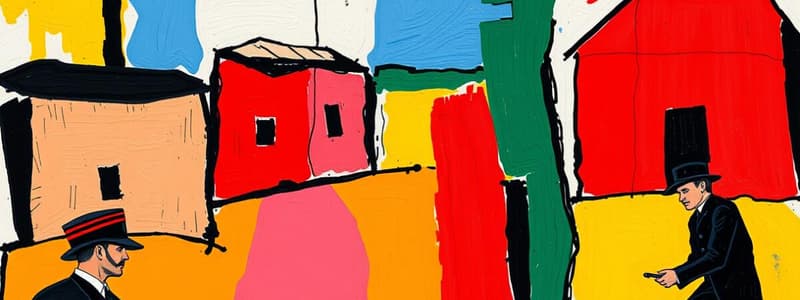Podcast
Questions and Answers
What was the period during which the U.S. began to rebuild after the Civil War?
What was the period during which the U.S. began to rebuild after the Civil War?
- Civil Rights Era
- Reconstruction (correct)
- The Gilded Age
- Post-war Era
What did the Wade-Davis Bill propose?
What did the Wade-Davis Bill propose?
Congress, not the president, be responsible for reconstruction.
Who led the Radical Republicans?
Who led the Radical Republicans?
Senator Charles Sumner and Representative Thaddeus Stevens.
What was the Freedmen's Bureau?
What was the Freedmen's Bureau?
What were Black Codes?
What were Black Codes?
What did the Fourteenth Amendment provide?
What did the Fourteenth Amendment provide?
What does the Fifteenth Amendment state?
What does the Fifteenth Amendment state?
What does it mean to impeach?
What does it mean to impeach?
Who were the scalawags?
Who were the scalawags?
What is sharecropping?
What is sharecropping?
What was the Panic of 1873?
What was the Panic of 1873?
What significant event marked the end of Reconstruction?
What significant event marked the end of Reconstruction?
Match the following words to their definitions:
Match the following words to their definitions:
Flashcards are hidden until you start studying
Study Notes
Reconstruction
- Period from 1865 to 1877 where the U.S. sought to rebuild after the Civil War.
- Involved political, economic, and social restructuring of the South.
Legislation and Amendments
- Wade-Davis Bill proposed Congressional control over Reconstruction; vetoed by Lincoln.
- Fourteenth Amendment granted full citizenship to African Americans, providing a constitutional basis for the Civil Rights Act.
- Fifteenth Amendment prohibited voting discrimination based on race, color, or previous servitude.
- Civil Rights Act of 1866 aimed to grant citizenship and prevent Black Codes, eventually overridden by congressional votes.
Key Political Figures
- Radical Republicans aimed to diminish former slaveholders' power, led by Charles Sumner and Thaddeus Stevens.
- Andrew Johnson continued Lincoln's policies but faced conflict over Reconstruction approaches.
- Hiram Revels became the first African American senator.
Social and Economic Impact
- Freedmen's Bureau provided assistance to newly freed slaves and poor whites.
- Black Codes imposed restrictions on African Americans' freedoms and rights.
- Economic hardship led to sharecropping and tenant farming, with many African Americans working the lands they once owned.
Violence and Resistance
- Ku Klux Klan emerged as a white supremacist group targeting African Americans and their allies.
- Anti-black violence surged post-Civil War, with thousands killed and properties destroyed.
Political Developments
- Reconstruction Acts of 1867 divided the South into military districts and enforced voting rights for African Americans.
- Political alignment shifted dramatically during the 1866 Congressional Elections, with Republicans claiming a supermajority.
Economic Crisis
- The Panic of 1873 triggered a significant economic depression, complicating recovery efforts.
- Rising tensions and recovery challenges prompted increased taxation and reform projects by new Republican governments.
End of Reconstruction
- Compromise of 1877 ended federal military presence in the South, allowing Democrats to regain control.
- The Amnesty Act enabled many former Confederates to vote, further shifting political balance.
- Ongoing scandals during Grant’s presidency weakened Republican unity, leading to reduced support for Reconstruction.
Social Context
- Jim Crow Laws enforced racial segregation, diminishing rights for African Americans in the post-Reconstruction era.
- The term Solid South emerged, referring to the unyielding Democratic support in Southern states.
Key Events and Figures
- Election of 1876 featured Rutherford B. Hayes versus Samuel J. Tilden, with significant disputes impacting the outcome.
- Influential figures like Thomas Nast galvanized public opinion against corruption while Nathan Bedford Forest helped establish the KKK.
Concluding Dynamics
- Redemption saw Democrats reclaim political control in the South, resulting in a systemic rollback of Reconstruction gains.
- Continued Supreme Court rulings limited Federal government ability to protect African American rights, cementing the social struggles that would persist for decades.
Studying That Suits You
Use AI to generate personalized quizzes and flashcards to suit your learning preferences.



